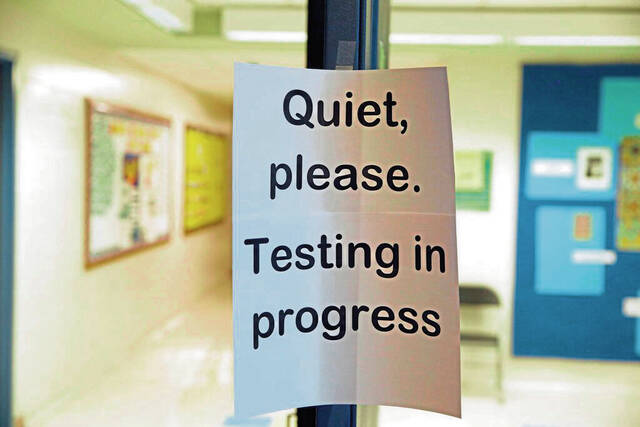An internal battle waged in Gabby Smith’s mind over her college admissions process.
It wasn’t over which colleges to apply to or which major to choose. It had nothing to do with tuition costs or scholarships.
The Plum senior struggled over a weighty decision that has come to the forefront of college admission prep since the dawn of the covid-19 pandemic: whether to include an ACT test score in an application to colleges and universities.
“Standardized tests always trip me up,” said Smith, who plans to study biology. “I know I’m a strong student, and the standardized tests represent the opposite of what I’m able to do with school and academics.”
Since spring 2020, many colleges and universities nationwide — including Ivy League institutions such as Harvard, Columbia, Cornell and Princeton — have suspended the requirement of a standardized test as part of a student’s application. Some have abolished the requirement altogether, while others have left the decision as optional for students who feel their SAT or ACT score will make them a more attractive candidate.
Before the pandemic, about 40% of colleges and universities did not require applicants to submit standardized test scores, according to educational nonprofit FairTest.
As of this month, more than 80% of higher education institutions don’t require such scores for admission, FairTest reported. Every college and university in Southwestern Pennsylvania currently allows most applicants to choose whether they want to share standardized test scores. Those seeking admission into honors colleges or other specialty admissions still could be required to submit scores.
That means high school students are left to decide whether to take the SAT or ACT test at all.
“It’s definitely something that everybody is still trying to navigate at this point,” said Penn-Trafford High School counselor Melissa Sutmire. “The kids aren’t sure, and when we’ve contacted admissions reps, they sometimes don’t have a straight answer for us either.”
How are colleges weighing scores?
Traditionally, SAT and ACT scores were viewed as an indicator of a student’s grasp of educational concepts and his or her ability to flourish in a college setting. SAT scores might not have been the determining factor in a student’s admission, but they played a role.
Although some schools had moved away from standardized test requirements before the pandemic, the onset of covid turned college admissions on its head.
Take the University of Pittsburgh. It went test-optional in September 2020 and announced last month that it would extend the policy until at least 2025.
About half of Pitt’s current freshman class applied without a standardized test score, said Kellie Kane, Pitt’s director of admissions. Students who chose to withhold a test score were required to provide supplemental materials such as essays and personal statements as part of their applications.
Kane said there is “no benefit” at Pitt to applying with or without a standardized test score.
“It truly is about what a student feels is the best representation of who they are,” she said.
Many other test-optional schools echo similar sentiments.
Recent data reflect, at least temporarily, students shifting away from testing.
About 30% fewer high school students nationwide took the SATs in 2021 (1.5 million students) compared with 2020 (2.2 million), according to College Board, the company that administers the SAT exam. As of September, 1.7 million students had taken the SAT in 2022.
The number of students taking the ACT exam also is down from 2020. This year, about 1.35 million students have taken the ACT, according to Inside Higher Ed, which tracks college and university topics and trends. That’s up from about 1.3 million students last year but down from 1.67 million in 2020.
Test scores also are lower.
The average score on the ACT for the Class of 2022 was 19.8, the lowest in more than three decades, according to the ACT. The maximum score is 36.
SAT scores fell slightly. This year’s average score was 1,050, compared with 1,060 for the Class of 2021. Students can score a maximum of 1,600 on the SAT.
Things to consider
John Izzo — franchise owner of Class 101 Pittsburgh East, an Irwin educational consultant — encourages students to test regardless of a college’s admissions requirements.
“There’s a difference between getting in and getting in with scholarship money,” Izzo said.
He added that scores can benefit students who wish to explore honors options or specific programs.
Smith of Plum is one of Izzo’s students. She ultimately decided to submit her ACT “superscore” — the average of her best scores after multiple test attempts — to schools that would accept it. She didn’t send a score to Penn State, the only school on her list that would not accept superscores.
“It was strategic,” said Smith, who applied to seven colleges.
Although many colleges insist that a standardized test score won’t give priority to an applicant, Izzo said students still can use scores to their advantage — for example, if students have a score that is at or above the average applicant’s score for that college.
Hoon Kim, a college admissions consultant at Allegheny County educational organization Pittsburgh Prep, agreed. Generally, Kim said, students who wish to attend top schools or seek scholarship money haven’t wavered in their choice to take standardized tests.
What’s more, Kim said, students with unfavorable grades on their transcripts might benefit from a high SAT or ACT score.
“The SATs allow them to showcase their abilities and provide documented evidence that they can succeed,” he said.
Test-optional blessings
Before the rise of the test-optional policies, a lower SAT score could have reflected poorly on a student with an otherwise stellar record. For that reason, Kim said, he believes the test-optional movement has been a blessing for many high school students.
“(Test-optional applications) provide an opportunity for students to showcase who they are, especially if they have testing anxiety,” Kim said. “A student could be valedictorian, president of school clubs, and their only blight is their SAT score.”
When it came time to apply to colleges, Penn State New Kensington freshman Genevieve Henderson decided against submitting her SAT score. As someone with obsessive compulsive disorder, Henderson said she found it difficult to sit in a classroom for hours taking a test. A standard SAT or ACT exam lasts about three hours.
“I feel like my GPA was a better representation of my knowledge because I’m not a ‘test taker,’ ” said Henderson, who graduated from Burrell High School.
Standardized test scores might not reflect who a student is academically — and could even be misleading, said Barbara Hinkle, a former vice president at Seton Hill University with decades of experience in the university’s admissions process. Seton Hill went test-optional about 10 years ago.
Hinkle said she believes that standardized test scores offer only a “clue” into who a student is. She said they provide little information about how that student would perform in college.
“In my experience, there were some students who came in with outstanding standardized test scores who didn’t do well and didn’t stick around long,” Hinkle said. “There were other students who came in and turned out to be shining stars.
“My takeaway from all that is there are people who are good at taking tests and there are people who aren’t good at taking tests. Whether you’re good at it or not does not predict your outcomes or successes.”
More changes to standardized testing are on the horizon. College Board announced this year that the SAT will become a shorter, digital test by spring 2024. The ACT already can be taken online.
It’s too early to tell whether the test-optional movement will stick. Regardless, there is a “seismic shift” happening in college admissions, Kim said.
“To think that taking the test-optional approach will resolve all difficulties is naïve,” he said, “but focusing too much on exams can be a barrier for students who would thrive.”















